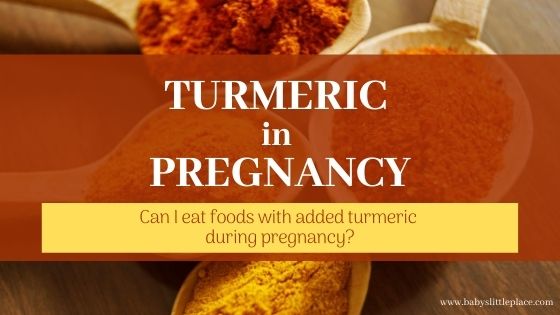
Is turmeric safe in pregnancy?
The use of spices in pregnancy is, for many, almost taboo. Not because spices would be harmful in general, but mostly due to insufficient knowledge of this topic. Yes, indeed, pregnant women should not overdo with spices, but in a reasonable quantity, you can expect only the benefits from the majority. In this article, I want to focus on turmeric. Is turmeric safe in pregnancy? Are there any turmeric’s potential side effects or health benefits on pregnant women and the fetus, etc?
Turmeric [Curcumin] in Pregnancy
Turmeric is a spice powder of yellow color, obtained from the root of the ginger-related plant Curcuma longa. Besides its independent use, it is also found in various mixtures of spices, among which curry is the most used one.
Turmeric is safe to consume in pregnancy, but do not overdo it! A pregnant woman can continue to use turmeric safely in the preparation of her favorite dishes! However, it is better to avoid consuming turmeric for medical purposes, i.e., in larger quantities or using it as a supplement during pregnancy.
Turmeric has been used as a flavor, coloring, and for medical reasons for thousands of years. It is full of antioxidants, contains manganese, iron, vitamin B6, a lot of fiber, and potassium. Turmeric’s root is well known for its anti-inflammatory effects, so it was primarily used as an anti-inflammatory drug in traditional Indian and Chinese medicine.
Are turmeric supplements safe during pregnancy?
The active ingredient in turmeric is curcumin. Curcumin has a lot of positive effects on the human body, but medical studies about its safety during pregnancy haven’t been done yet.
For now, turmeric’s effects on reproduction had been conducted only on animals, more specific, on rats and mice. Rats born to females who consumed higher doses of curcumin in pregnancy had a lower fetal weight, which was also confirmed by another study conducted on mice.
These findings indicate that consuming turmeric in high doses may harm the development of the embryo. But, without studies conducted on humans, the turmeric’s effects on pregnant women couldn’t be confirmed for sure.

Do not use turmeric supplements during pregnancy!
Is turmeric used in cooking safe during pregnancy?
The guidelines about turmeric in pregnancy are only logical conclusions obtained from animal studies. As this is a sensitive period, caution is advised for all things we do not exactly know how they affect pregnancy. And the same goes for turmeric in pregnancy. Of course, that applies mostly to high doses, such as turmeric supplements, with a high curcumin concentration.

It’s a different story with using it as a spice in the cuisine. Ground turmeric used in cooking contains lower amounts of curcumin, so consuming it in moderation, such as in curries and other dishes, during pregnancy is considering safe.
In fact, some studies confirm turmeric’s benefits on reproduction too. It has been reduced ovarian cysts in rats with polycystic ovary syndrome and inhibits the growth of endometrial cells by reducing estrogen production in animals. These findings indicate that turmeric may benefit the female reproductive system in a variety of ways too.
Potential benefits of turmeric during pregnancy
Turmeric’s anti-inflammatory properties in non-pregnant people are well known. As it is full of antioxidants, it helps to prevent cancer and even possesses antimicrobial effects. There is no doubt about its health benefits on non-pregnant humans, but as I said, taking turmeric for medical reasons in pregnancy is not advised.
Although some studies predict a positive effect on pregnant women and babies, there is not enough research about its side effects in pregnancy yet. It’s better to use other natural remedies, and consume turmeric only as a spice while pregnant!
The word is still out whether the benefits of turmeric outweigh the risks during pregnancy. Therefore, take the following benefits of taking turmeric supplements during pregnancy as information only!
- preventing preeclampsia
- relieving heartburn
- turmeric can relieve joint pain and back pain
- prevention of plaque and pregnancy gingivitis
- turmeric could reduce inflammation during pregnancy and therefore boost a fetus’s brain development
- curcumin can ease swelling in pregnant women
Continue to enjoy your favorite dishes with added turmeric, as culinary amounts may still provide benefits during pregnancy, especially if you consume it as part of a balanced diet.
Potential risks of turmeric during pregnancy
As I have already pointed out, there are no studies conducted on pregnant women. Such studies would raise too many ethical concerns. However, animal studies have shown lower birth weight, but this is all that has been scientifically proven about turmeric’s negative effects on reproduction so far.
Can turmeric cause a miscarriage?
Some doctors assume that curcumin might mimic the estrogen in the pregnant woman’s body. That could promote a menstrual flow or stimulate uterine contractions, which raises the risk of premature birth and miscarriage. But no clinical trials to confirm or refute this hasn’t been done yet!
To avoid any potential risks to pregnant women and babies, health care providers recommend against turmeric supplements in pregnancy!
Summary
The culinary use of turmeric during pregnancy or breastfeeding is, in principle, completely safe. However, turmeric-based dietary supplements can be problematic during this period.
Although scientists can’t confirm the actual risks, there is the potential that it could trigger early labor or miscarriage, if consuming large amounts of curcumin during pregnancy.
In any case, it is necessary to consult your OB-GYN in advance regarding any dietary supplements during pregnancy or breastfeeding!
